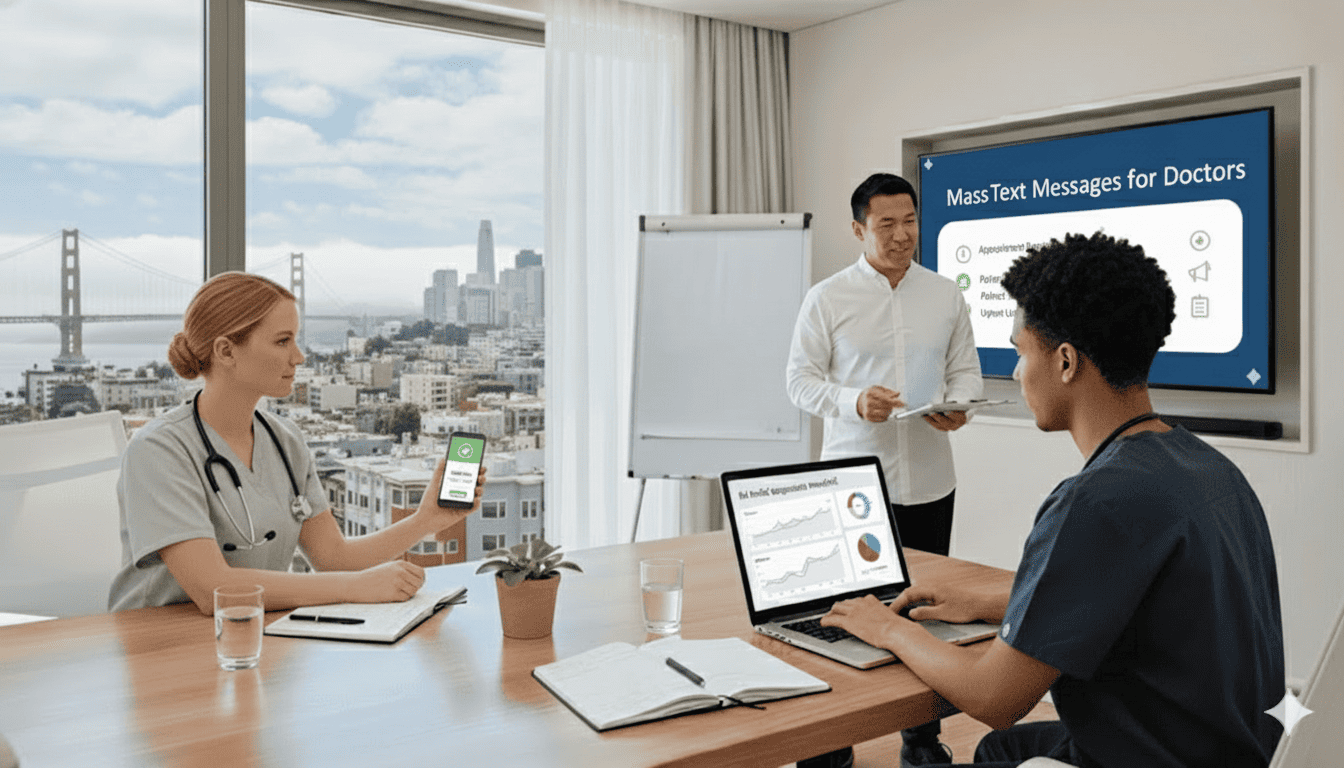5 Ways eCW Users Can Use Bulk Messaging to Engage Patients
💡 Learning how to send bulk SMS in eCW changes the way clinics connect with patients. Mass texting enables clinics to reach patients faster and...
7 min read
Gregory Vic Dela Cruz : Updated on September 12, 2025
-1.png)
In modern healthcare, communication is everything. Patients expect timely updates, reminders, and clear instructions. What's more, they expect it on their phones. Yet many clinics still struggle with outdated systems. Missed reminders and confusing workflows frustrate patients and cost clinics revenue. That’s why many practices, including those using eCW, are turning to bulk messaging.
Sending bulk messaging to patients for eCW users has unique challenges. Unlike standard SMS blasts, healthcare providers must navigate HIPAA rules. They're required to manage patient consent and ensure audit trails are intact. A single unsecured message can mean thousands in fines or lost trust.
This blog takes a deep dive into HIPAA compliant bulk messaging FAQs for eCW users. In this article, we'll cover the following:
Whether you’re wondering “can I text all patients in eCW?” or how to respect patient consent bulk SMS preferences, you’ll find clear answers here. Let’s break down the essential questions and best practices every eCW user should know.
Bulk messaging in healthcare refers to sending the same message to a group of patients at once. Unlike one-on-one texting, bulk messaging allows clinics to send reminders, recalls, health alerts, or billing notices to dozens or thousands of patients simultaneously. The purpose is efficiency: instead of staff calling each patient, messages are sent instantly via SMS, email, or voice. In the context of eCW, sending bulk messaging to patients means leveraging integrated platforms that connect directly to scheduling and patient data.
Yes, bulk messaging can be HIPAA compliant if handled correctly. The key is using a secure platform that encrypts all messages, maintains audit trails, and verifies patient consent. HIPAA compliance prohibits sharing protected health information (PHI) through unsecured channels. That’s why using personal phones or generic SMS apps poses risks. A HIPAA compliant bulk messaging platform ensures all communication is logged, encrypted, and tied back to the patient chart, protecting both the clinic and the patient.
One-to-one texting is used for individual communication—rescheduling a single patient or answering specific medical questions. Bulk messaging is designed for scale, like notifying all patients about a flu clinic or sending annual check-up reminders. While both methods require HIPAA compliance, bulk messaging carries additional considerations such as segmentation, consent tracking, and message relevance. Sending bulk messaging to patients for eCW users must therefore include mechanisms for opt-in and opt-out, plus careful message targeting to avoid compliance risks.
Using regular SMS without encryption or audit trails risks exposing PHI. For example, a reminder that includes a provider name or procedure could be intercepted or seen by unintended parties. HIPAA penalties range from $100 to $50,000 per violation, and patients may lose trust in the practice. Regular SMS also lacks opt-out management, meaning patients who no longer wish to receive messages may still get them, increasing legal and reputational risks. Secure patient communication FAQs consistently emphasize the importance of using HIPAA-compliant platforms rather than standard texting apps.
We've previously covered the exact steps on how to send mass text in eCW. Let's now go into the most common questions eCW users have when it comes to bulk SMS.
eCW itself does not provide a native HIPAA compliant bulk messaging feature. While it allows some patient portal messaging, it is limited in scale and often fails to meet patient preferences for mobile-first communication. This is why most eCW users adopt third-party platforms like Curogram, which integrate directly with eCW scheduling and patient data.
Several communication platforms claim to integrate with eCW, but only a few provide true HIPAA compliance and workflow automation. Curogram is designed specifically for healthcare, ensuring secure, two-way communication, automated reminders, and full audit trails. It syncs with eCW in real time, eliminating manual work for staff and ensuring accuracy. Other platforms may offer partial integrations but lack the compliance features healthcare organizations require.
The stakes for compliance are high. HIPAA violations not only carry steep financial penalties but can damage patient trust irreparably. A HIPAA-compliant platform ensures every bulk message is encrypted, logged, and accessible for audit. It also handles patient consent bulk SMS tracking, so opt-outs are respected and documented. Choosing a non-compliant platform may save costs upfront, but the long-term risks far outweigh the benefits.
Curogram integrates seamlessly with eCW by syncing directly with appointment data, patient contact information, and scheduling workflows. When sending bulk messaging to patients for eCW users, this integration ensures that reminders, health alerts, and recalls are personalized, timely, and accurate. Staff don’t need to re-enter data, and patients receive communication that is consistent with their medical records. Every message is encrypted and logged in compliance with HIPAA and SOC 2 standards, making Curogram an ideal solution for eCW users.
Yes. HIPAA requires patient consent for receiving bulk messages that may include protected health information. Patient consent bulk SMS ensures that individuals have control over how they are contacted and allows clinics to demonstrate compliance during audits. Clinics typically capture consent during patient registration or through digital forms integrated with eCW. Secure patient communication FAQs emphasize that opt-in must be explicit, not assumed, and patients should always be able to opt out by replying with keywords like “STOP.”
Bulk messaging can cover a wide range of communication types: appointment reminders, recalls for preventive care, health alerts like flu shot availability, and billing reminders. While administrative details are generally safe, sensitive PHI like test results should never be included in unsecured SMS. Using HIPAA compliant bulk messaging FAQs as guidance, clinics should limit messages to necessary information and, when required, use secure links that direct patients to an encrypted portal for details. Sending bulk messaging to patients for eCW users makes this process seamless by connecting appointment and billing data directly to messaging workflows.
In most HIPAA-compliant platforms, replies are routed to a secure inbox where staff can respond individually. This is important because a patient reply could include PHI, and clinics must be prepared to handle that securely. For example, a patient might respond to a recall message with a question about their chronic condition. A compliant platform ensures the message is logged, encrypted, and tied to the patient’s record. Without this safeguard, clinics risk HIPAA violations. Secure patient communication FAQs also note that staff training is critical to avoid responding from personal phones or unsecured systems.
Audit trails and reporting are central to compliance. Every bulk message sent must be documented, including the recipient, time, and content. This transparency allows clinics to demonstrate compliance if audited and provides a defense in case of patient complaints. Reporting tools also show delivery rates, open rates, and responses, helping clinics optimize communication strategies. HIPAA texting rules require these logs to be maintained securely. Platforms like Curogram provide built-in audit trails tied directly to eCW, giving administrators confidence that every bulk message meets regulatory requirements and supports compliance with healthcare texting regulations.
.png?width=1536&height=1024&name=sending%20bulk%20messaging%20to%20patients%20for%20eCW%20users%20-%20mid%20(1).png)
Patients are more likely to engage with short, easy-to-read messages. A HIPAA-compliant reminder might say, “Reminder: You have an appointment with Dr. Patel on 10/12 at 10 AM. Reply C to confirm or R to reschedule.” This avoids unnecessary PHI while giving clear instructions. Secure patient communication FAQs consistently recommend brevity to reduce confusion and increase response rates.
Not every message should go to every patient. For example, flu vaccine reminders should target patients over six months old, while mammogram recalls should focus on women within the recommended age range. By using segmentation, clinics increase relevance and avoid overwhelming patients. Sending bulk messaging to patients for eCW users allows administrators to filter by demographics, visit type, or diagnosis, ensuring messages are targeted and meaningful.
Respecting opt-out requests isn’t just best practice—it’s legally required. HIPAA compliant bulk messaging FAQs emphasize that ignoring opt-out requests exposes clinics to regulatory action and reputational damage. eCW users benefit from platforms that sync opt-out status automatically, so staff don’t have to manage it manually.
Automation reduces staff workload, but oversight is still needed. Clinics should regularly review messages for accuracy, compliance, and relevance. Monitoring ensures no sensitive PHI is accidentally included and that patients are receiving valuable, appropriate updates. By combining automation with oversight, clinics strike the right balance between efficiency and compliance.
Curogram is built for healthcare, with encryption, audit trails, and consent management at its core. It addresses all HIPAA compliant bulk messaging FAQs, ensuring messages are secure and logged while protecting patient data.
Curogram integrates directly with eCW, syncing schedules, demographics, and patient preferences. This eliminates manual entry and ensures messages are accurate and timely. For clinics asking “can I text all patients in eCW?”—Curogram makes it possible while maintaining compliance.
By automating reminders, recalls, and health alerts, Curogram cuts phone volume and manual tasks. Staff gain time to focus on patient care, while patients appreciate convenient communication.
Clinics using Curogram report up to a 30% reduction in no-shows, quicker patient responses, and improved satisfaction. For eCW users, sending bulk messaging to patients through Curogram is both efficient and compliant.
Bulk messaging is no longer a “nice-to-have” for clinics. Patients expect clear, timely updates. Practices need efficient communication tools to keep schedules full and staff productive. But in healthcare, efficiency cannot come at the cost of compliance. Clinics must continue to abide by HIPAA texting rules and healthcare texting regulations. These require secure platforms, patient consent, and audit trails for every message sent.
Curogram stands out as the ideal solution to balance compliance with efficiency. It integrates directly with patient data, automates reminders, and provides HIPAA-compliant workflows. Curogram simplifies healthcare compliance while enhancing engagement.
Want clear answers and a simple solution? Discover how Curogram makes bulk messaging in eCW HIPAA compliant and hassle-free. Schedule a free demo today.

💡 Learning how to send bulk SMS in eCW changes the way clinics connect with patients. Mass texting enables clinics to reach patients faster and...

💡 Mass messaging Tebra use cases are changing how independent clinics communicate with patients. Instead of relying on calls or emails, you can use...

💡 Mass messaging Practice Fusion use cases produce real outcomes for small clinics. With bulk SMS, independent clinics reach more patients,...